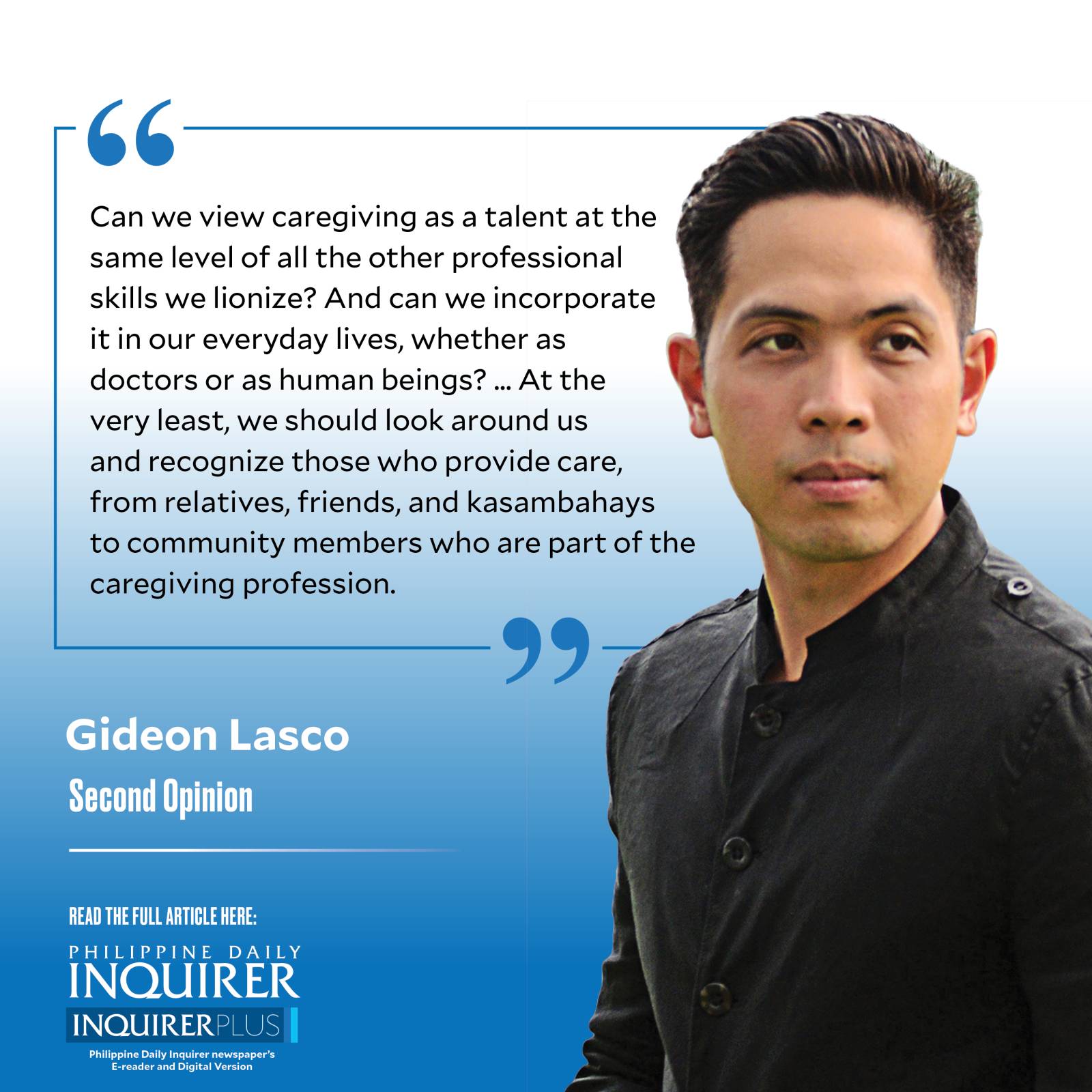
Caregivers—whether professionals looking after their patients or people caring for their loved ones—play a major role in our health-care system, and indeed, our whole society, but they do not get the same recognition as physicians or nurses. In fact, the act of caregiving itself does not get as much attention as the technological, biomedical, pharmaceutical, and financial aspects of health care, even if it lies at its very core.
I was reminded of this while reading “The Soul of Care,” the recently published book by the physician-anthropologist Arthur Kleinman. A longtime professor at Harvard, Kleinman called for going beyond the “professional sector” (e.g., doctors, nurses) and including the “folk sector” (e.g., traditional healers) and the “popular sector” (e.g., self-medication and home remedies) in analyzing health-care systems. He also advanced the idea that every culture has its own “explanatory models” to make sense of illness (e.g., lamig causing pulmonya; washing dishes after strenuous work causing pasma). His later works on “local moral worlds” were reminders for us not to impose our own categories in understanding people’s practices; rather, we must ask “what is at stake” for the people we study and work with.
In his latest book, he reviews and illuminates these concepts. For instance, as part of his narrative of spending a month in Manila in 1970 to help battle a cholera epidemic, he recounts an episode in which he treated a severely dehydrated boy by inserting an intravenous line directly to his abdomen: a clinically heroic (and likely necessary) act, but one that violated the boy’s mother’s values. Looking back, he wonders if he did the right thing, even though he saved the boy’s life.
Far beyond a review of his academic contributions, however, and far more than an autobiography, “The Soul of Care” brings Kleinman’s oeuvre to a full circle, adding the personal to the biomedical, psychiatric, and the anthropological in reflecting on health care. He accomplishes this turn through a moving and deeply insightful account of caring for his wife Joan, who lived with Alzheimer’s for a decade before passing away in 2011.
Throughout his experience as a caregiver, Kleinman experienced how frustrating and demoralizing the health-care system was, with specialists often unable to give advice that actually matters for daily living; instead, it was “the family and social caregiving network that make all the difference.” Society, too, can be cruel or apathetic to those who are suffering; Kleinman favorably contrasts their experience in a trip to China, in which the people were “warmly human,” with their experiences back home, hinting at the role of culture in caregiving (another aspect often omitted in biomedicine).
In terms of the health-care system, his conclusion are the ones with which I began this essay: that care has been marginalized in today’s health-care systems. He cites studies that show how first-year medical students are even better than graduating students in psychosocial aspects of care to implicate medical education, alongside advances in medical and pharmaceutical technologies that reduce the patients as “cases,” “records,” or “consumers of products,” in this dehumanization of care.
Meanwhile, at the personal level, he comes to the conclusion that caring for someone you love is a duty that is deeply human: “You do it because it is there to do.”
—————-
Some of Kleinman’s reflections are particular to Euro-American contexts, for instance, sending those with terminal illness to “assisted living facilities.” Nonetheless, his insights resonate everywhere, arguably even more so in the Philippines, where we “export” caregivers and health professionals around the world; just as doctors can view patients as “cases,” government can view them as “resources” with economic value, not as individuals worthy of dignity or fair compensation. As the COVID-19 pandemic showed, we, as a nation, are not good in caring for those who care for us.
Can we view caregiving as a talent at the same level of all the other professional skills we lionize? And can we incorporate it in our everyday lives, whether as doctors or as human beings? As I write these lines, I think of our late Ate Cely, a family member who would accompany me whenever I would get sick as a child, and of course, my ever-caring mother, and my late Lola Rosing. At the very least, we should look around us and recognize those who provide care, from relatives, friends, and kasambahays to community members who are part of the caregiving profession.
As Kleinman concludes, care is at the heart of the messiness, complexity, and beauty of what makes us human:
“By giving care, we recognize that we, too, need to be cared for. And that innermost need, our existential precariousness, is also contradicted and made less threatening and more livable by our commitment to another, together with whom we travel towards our shared human end. Perhaps in the end, this is what transforms the soul of care into the care of the soul.”
—————-
glasco@inquirer.com.ph

